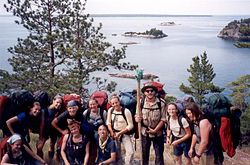Founding and early history
The first Outward Bound school was opened in Aberdyfi, Wales in 1941 by Lawrence Holt with financial support from the Blue Funnel Line shipping company based on the initiative of German educator Kurt Hahn. [6] The name Outward Bound was derived from the nautical term for a ship leaving safe harbour for the open sea. [7] Outward Bound grew out of Hahn's work in the development of the Gordonstoun school and what is now known as the Duke of Edinburgh's Award in the United Kingdom. Outward Bound's founding mission, during the Second World War, was to improve the survival chances of young seamen should their ships be torpedoed in the mid-Atlantic. [5]
James Martin Hogan served as warden for the first year of the school. [8] This mission was established and then expanded by Capt. J. F. "Freddy" Fuller who took over the leadership of the Aberdyfi school in 1942 and served the Outward Bound movement as senior warden until 1971. [9] Fuller had been seconded from the Blue Funnel Line following wartime experience during the Battle of the Atlantic of surviving two successive torpedo attacks and commanding an open lifeboat in the Atlantic Ocean for thirty-five days without losing a single member of the crew. [10]
An educational charity, named The Outward Bound Trust, was established in 1946 to operate the school. [2] [3] A second school followed in England at Eskdale Green in 1950. [5] The first Outward Bound program for women was held in 1951. During the next decade, several other schools opened around the United Kingdom. [5] A school in Lumut, Malaysia opened in 1954, the first outside the United Kingdom. [11] [5] Outward Bound Australia was founded in 1956. [12] The first Outward Bound USA course was run in Puerto Rico in 1961 for the Peace Corps, which it helped to shape. [13] [14] Outward Bound New Zealand was founded in 1962, Outward Bound Singapore established in 1967 and Outward Bound Hong Kong in 1970. [3] [15] Outward Bound Costa Rica was founded in 1991. Outward Bound Peacebuilding was formed in the early 2000's working to leverage and link ideas related to peacebuilding and experiential education.
From the inception of Outward Bound, community service was an integral part of the program, especially in the areas of sea and mountain rescues and this remains an important part of the training for both staff and students. [8] During the period 1941 to 1965 in the United Kingdom, the philosophy of the schools evolved from "character‐training" to "personal growth" and "self‐discovery". [16]
Aberdyfi remains the organisation's "nerve-centre" in the United Kingdom. Over the course of a summer in 2010, 7000 to 8,000 students attended courses at the Aberdyfi centre and more than a million young people have attended Outward Bound courses in the UK since 1941. [17] Prince Philip served as the Patron of the Outward Bound Trust for several years before handing over to his son Prince Andrew, who resigned in November 2019. [18]
Current
Outward Bound International was founded as a non-profit organisation in 2004 to license the use of the brand name "Outward Bound" and to provide support for the international network of schools. [19] Today there are organisations, called schools, in more than 35 countries with 250 wilderness and urban locations around the world which are attended by more than 250,000 students each year. [1] [20] Separate organisations operate the schools in each of the countries in which Outward Bound operates. [4] In 2025 Outward Bound has licensees operating 37 schools in 34 countries across 6 continents.
Since its founding in the middle of the last century, Outward Bound has encouraged individuals to test their physical and emotional limits in challenging outdoor adventure programs. The experiences are a means of building inner strength and a heightened awareness of human interdependence. [21] Outward Bound's compass rose emblem serves as the logo for almost all the schools around the world. [19]


